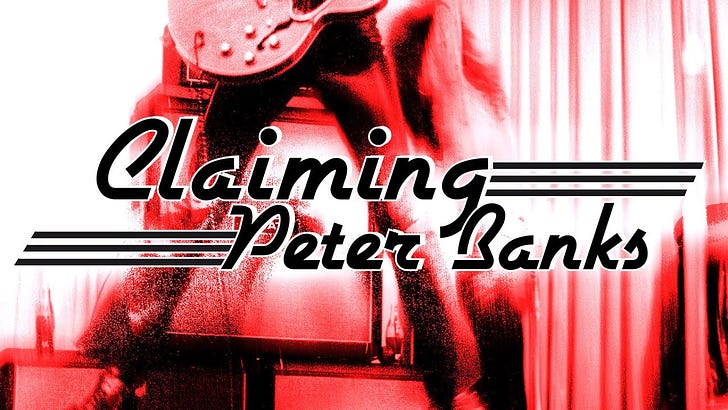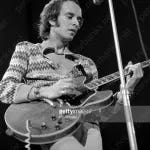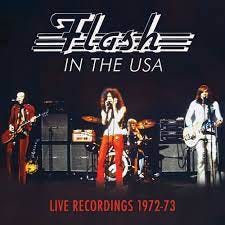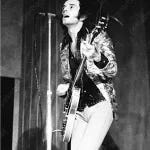Peter Banks, the guitarist in the first lineup of Yes, belongs to an unusual rock-trivia category: Musicians whose ideas shaped a massive band but did not participate in its longterm success. (See also: Peter Green and Bob Welch, Fleetwood Mac.)
Banks was on board for the first two Yes albums (Yes from 1969, Time and a Word from 1970), and was central to the development of the episodic stop-on-a-dime arrangements and shapeshifting instrumental textures that became the band’s trademark. Danny Baker, the veteran UK rock journalist at the weekly NME, once described him as “the architect of progressive music.”
Been thinking about Banks this week, listening to a just-issued three-disc assemblage of live recordings made in the early ‘70s by Flash, the band Banks founded after Yes replaced him with Steve Howe.
The knocks on Flash are fairly predictable: Here’s a Yes-like band without the gilded voice of Jon Anderson or the springloaded rhythm of drummer Bill Bruford, doing tottering prog-rock suites that alternate between moments of blissed-out beauty and ponderous motific development. Because Yes quickly cornered the market on ambitious, moderately accessible progressive rock, any other outfit – even one led by a gifted guitarist with Yes pedigree – could seem like a cheap imitation.
Flash in the USA doesn’t entirely reverse that impression. It’s decidedly lo-fi – some tracks were recorded by fans, and even the board tapes suffer from a hazy shade of neglect. The material is drawn from the band’s three studio efforts – Flash and In the Can from 1972, Out of Our Hands from ’73 – and there are multiple versions of some of the better-known FM radio tunes. This is one of those compilations aimed at the remaining true believers, not the casually curious.
Unless, that is, you play guitar or consider yourself a student of rock guitar. Along with the crisper live Flash document In Public, which documents a uniformly strong Kansas show in 1973 and was released after Banks’ death in 2013, the new set offers significant ammunition for the argument that Peter Banks had his own iconoclastic, sometimes resolutely weird thing going.
The first eyebrow raising element is embedded within the instrumental writing. Banks framed the verses of Flash songs with daring, sometimes fitful technical displays that both set the stage for the vocals and often overshadowed them. Those phrases are sometimes the main event, but more often serve as transitions from the verses into the solo sections. And their grooves rarely remain steady: Like other progressive rock bands, Flash routinely changes up the rhythm or the meter by diving unexpectedly into a halftime free-fall or jetting into blindingly fast passages. (It must be said: These can sound like audition exercises designed by geeks in the School of Rock’s advanced-placement division.)
Lots of guitar soloists would diligently follow the outlines of the road maps, executing the tempo changes in roughly the same spots every night. Banks is rarely so predictable. He’ll switch from a wickedly inventive foray into blues-rock riffage into an unexpectedly placid, transcription-resistant ambient cascade of notes – and expect his cohorts to follow him. Almost every gesture of his solos delivers impressively technical feats of guitar with equally impressive theatrical flourishes.
And: The longer Flash tunes – “Small Beginnings,” “Children of the Universe,” “Black and White” – that appear multiple times on the three-disc set all visit strikingly different moods, largely at Banks’ whim. In a currently-in-production documentary about Banks – of course there’s a doc! – several of his Flash bandmates marvel at his ability to conjure up a new direction out of thin air, on the fly.
Here's the thing: These volcanic and volatile episodes happened at a moment of near peak creativity in the realm of rock guitar. The long shadow of the late Jimi Hendrix was inescapable. Jimmy Page and Eric Clapton were carving out gruff new contexts for the blues. Carlos Santana was ascendent. Howe was creating almost neo-classical electric guitar counterpoints in Yes.
Already there was an established dramatic arc for the rock guitar solo (see Deep Purple, many others), and Banks, despite his weird semi-exile, was pushing against it. At that key moment, his impulsive and frequently torrid solos suggested there were other paths available. Not many followed them. Does that diminish the contribution?








Turned me on to a new band. These guys are lots of fun!
Hi Tom. I’d forgotten how much I liked the 1st two Yes albums but never really followed up on Banks. I recall flashes logo but don’t think I heard the Lps. Thx as always for the nudge. Hope all is well.